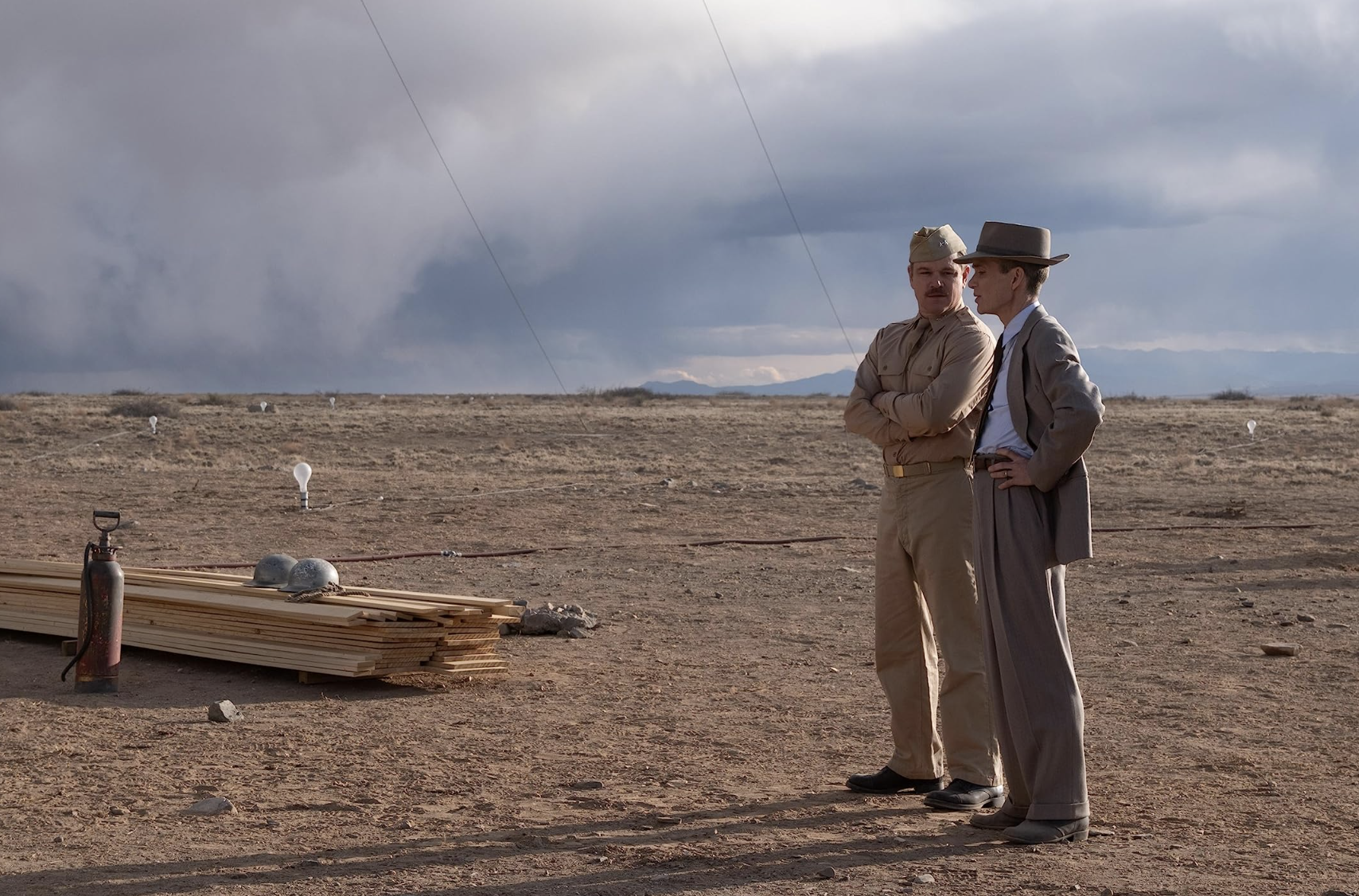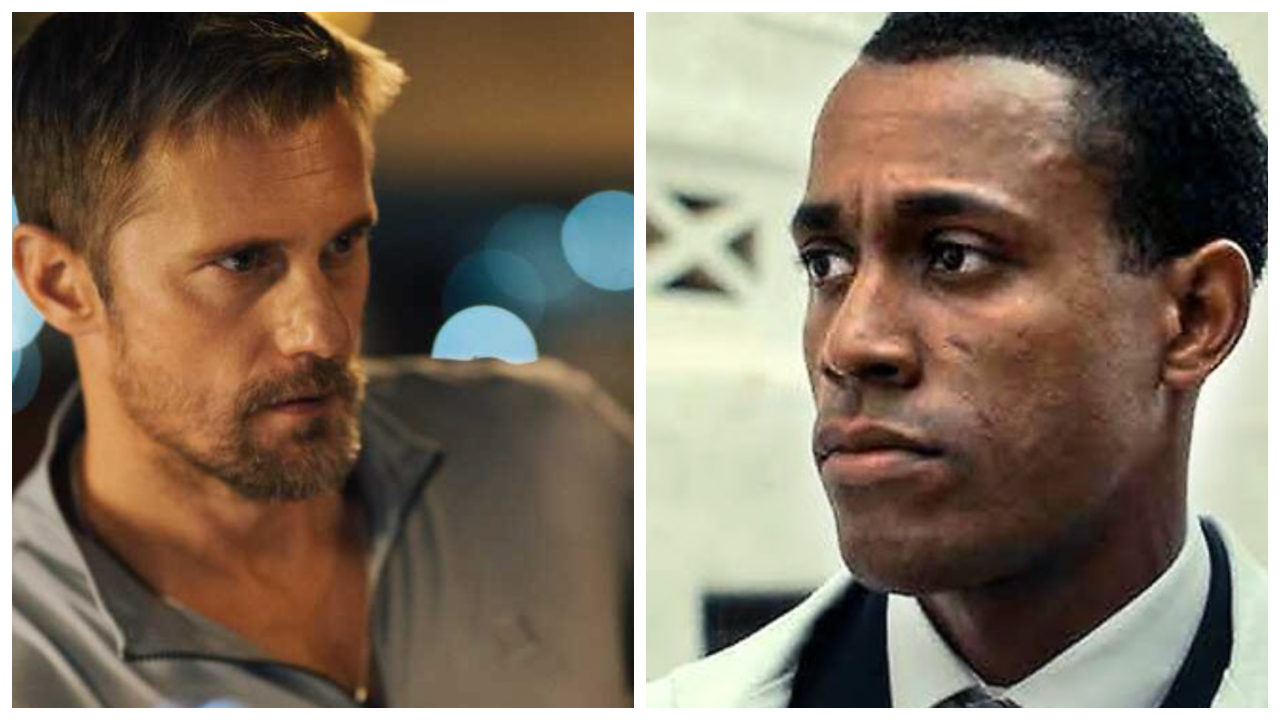If you think it’s wild that so many people turned out this past weekend to see a three-hour biopic about a theoretical physicist, well, wait till you hear that they actually showed up for a three-hour movie about a commerce secretary nominee’s Senate confirmation hearing.
The development of the atomic bomb is the event that makes Christopher Nolan’s Oppenheimer possible, both as a story and as a commercial proposition. You’re there to witness a big, fiery boom, to watch the great showman employ his much touted practical effects to recreate the 1945 Trinity nuclear test at Los Alamos. And J. Robert Oppenheimer himself is indeed the central figure, just like it says on the poster, imbued by Cilian Murphy with a slippery mystique that makes him seem worthy of the blockbuster treatment even as the film ultimately toys with his self-importance.
And yet, while I haven’t done the math (surely some Nolan-obsessed quant has), I’d estimate that close to half of Oppenheimer takes place after the U.S. drops the bomb on Japan. And a surprising, some might say disproportionate amount of screen time is given over to the question of whether Robert Downey Jr.’s Lewis Strauss will be permitted to join Eisenhower’s cabinet. There’s a reason for that, maybe even a good one.
Oppenheimer is not only told against the background of the contemptible history of 20th century U.S. anti-communism—I’d go so far as to call it a history of anti-communist opportunism in America, as refracted through the particular details of one man’s life and career. We see how wartime expediency led authorities to slacken the leash and look the other way (even while their knowledge of past leftist activity gave them leverage over the individuals they used) and how the Cold War handed politically savvy operators a blunt object with which to settle petty grievances after the Nazi defeat made premature anti-fascists expandable once again.
Yes, I can understand why Oppenheirmer is not being marketed that way. And it’s rewarding to see so many terrible people disappointed by what they didn’t see. Tech sociopaths who’d hoped for an “Avengers of Science” have complained that Oppenheimer is more concerned with “politics” than with celebrating the achievement of weaponizing atomic energy. (Honestly, we don’t need a big-budget film to show how amoral and destructive the pursuit of innovation as an end in itself can be—we’ve got the creeps telling on themselves every day on social media.) And certain sadists have expressed their wish that Nolan had rendered the destruction of Hiroshima and Nagasaki as gratuitous cineplex spectacle.
But the resentments and machinations of Strauss, the former Atomic Energy Commission chairman who tussled with Oppenheimer over the development of the U.S. hydrogen bomb program and other more personal matters, aren’t footnotes here. They’re essential to the story Nolan wants to tell of how figures who consider themselves world historical agents play the game and get played—with the final word on the matter delivered by none other than Einstein himself.
***
Oppenheimer is frankly an achievement I thought beyond Christopher Nolan, who’s hardly the most overrated director of the 21st century (people still take Darren Aronofsky seriously, after all) but whose reputation is continually fluffed for particularly grating reasons. Nolan makes movies that impress people who go to the movies to be impressed. Too often, his seriousness masquerades as intelligence and his fussiness passes as craft: His ideas, such as they are, flatter audiences that could conceivably have thought of them themselves, and his films square their circles with the self-satisfaction of a dad fitting that one last item no one thought he could into the family SUV.
Worse still, Nolan’s scripts often have the questioning sense of an alien who hopes that he can understand humans by awkwardly wedging what he mistakes for emotion into a puzzle-like narrative—I was merely agnostic before the fatuous climax of Interstellar, where the solution to a perplexing equation turns out to be “love,” afflicted me with Nolanitis. And I was further frustrated by how Dunkirk’s multiple timeline showoffery drained one of World War II’s most stirring moments of its drama. (Let us not discuss The Dark Knight Rises.)
In telling the story of Oppenheimer’s journey from bumbling Cambridge student to charmingly arrogant know-it-all, Manhattan Project overseer, and unlikely chick magnet, the film repeatedly jumps forward to the backroom 1954 inquisition where Oppenheimer is stripped of his security clearance and the 1959 Strauss hearing (shot in black and white), and I thought for sure the guy was gonna Dunkirk himself again. But here, Nolan’s refusal to tell a simple story simply suits the work at hand. The timelines aren’t so much parallel as kaleidoscopic, providing shifting perspectives on the man whose cultish admirers dubbed “Oppie” and on the circumstances that shaped and misshaped him.
Yes, there are only two major female characters, both of whom fuck Oppenheimer. As Jean Tatlock, Florence Pugh spends much of her time on screen topless, hopping off Oppie’s dick to check out his library and then back on to entice him into Sanskrit pillow talk. If she occasionally presents the illusion of a well-rounded human that’s to Pugh’s credit, not Nolan’s. Emily Blunt, as Oppenheimer’s wife Kitty, fares better. (Unlike many Nolan wives, she even manages not to die.) Through her unyielding sternness and constant tippling, Nolan sketches the silhouette of an uncomfortable yet undoomed marriage. She seethes about how much more politically savvy she is than her mate while his self-absorption prevents him from even considering the possibility of relying on her emotionally or intellectually.
To be fair, the male characters are often sketched just as economically. Many of Oppenheimer’s pleasures come from the simple old-school filmmaking reward of seeing a guy you know show up and nail a characterization in a few brief scenes. It’s not particularly deep, but it sure is satisfying to watch a middle-aged Josh Hartnett play Ernest Lawrence as an all-American company man, or Benny Safdie portray H-bomb impresario Edward Teller as an unsavory careerist, or Downey, all too relieved that he gets to act in a movie for grown ups again, endowing Strauss with perhaps an excess of visible cunning.
For all its great supporting parts, though, Oppenheimer is sometimes distractingly over-cast. Why is Buffy’s mayor of Sunnydale conducting a Senate hearing—and is that former Wyoming senator Alan Simpson on the panel evaluating Oppenheimer’s security clearance or am I starting to hallucinate? I don’t care how ominously you shoot him from behind or how apprehensively Matt Damon’s Gen. Leslie Groves talks him up, I will not believe that Casey Affleck has killed Bolsheviks with his bare hands. And Rami Malek is reserved for an 11th hour deathblow we didn’t need delivered, which serves to soften Oppenheimer’s fall from grace
There’s too much nefarious mustache-twirling in the final scenes, when, like a Bond villain, Oppenheimer’s true adversary steps forward and relates his evil plan at length. And too often Nolan wants to prove how much he remembers from American Prometheus, the Kai Bird and Martin J. Sherwin biography he’s working from. (As Nate Jones wrote in Vulture, “Few films have ever been more based on a book than Oppenheimer.”) And then there’s my most pedantic quibble, because a tight-ass like Nolan deserves the pedantry: In a discussion of communism, both Tatlock and Oppenheimer attribute “property is theft” to Marx rather than Proudhon—in fact ol’ Karl considered that idea to be self-contradictory petty bourgeois rubbish.
Oh, I could go on like this all day.
***
In other words, Christopher Nolan not only remains Christopher Nolan—he may be more Christopher Nolan than ever. But the director doesn’t overcome his flaws here so much as rush past them on the way to making you overlook them. In fact, Oppenheimer consistently, well, impressed me with all the mistakes the director didn’t make.
Crucially, Nolan and Murphy never treat Oppenheimer as a simply tragic figure—the scientist’s biography is too unruly for that, his psychology too complex, his delusions all too human. Murphy plays Oppenheimer as a man whose sense of guilt and self-importance are inseparable. And Nolan doesn’t settle for a big movie about broad themes like “power,” or “hubris,” or “the misuse of knowledge”—Oppenheimer is too persistently rooted in narrative for all that. In fact, Nolan has never reminded me more of his fellow Brit David Lean, illuminating a particular kind of cultural idiocy through the story of a remarkable self-styled hero. (He lacks Lean’s control, eye, and panache, of course, but on the plus side he’s never cast Alec Guinness as an Arab.)
Murphy sounds at times oddly like John Cale and looks like David Byrne with a more expensive haircut. More importantly, he also looks very much like Oppenheimer—his eerie blue eyes have the needed charismatic tint, and he’s keenly aware of his image. There’s even a scene where Oppenheimer dons his wide-brimmed fedora and grabs his pipe and prepares to step into iconicity, and he may as well be Batman donning his mask and cape for the first time.
As for the Los Alamos money shot, Nolan gins up the suspense with all his pacing wizardry—no mean feat, since we all know that the bomb does work. Counterintuitively, though, he doesn’t go for pure spectacle. He’s talked a big game about how the Trinity test should be seen under ideal conditions. (And he has the sort of fans so determined to see his work in the technically “correct” manner that they’re willing to endure front row, far corner sets for IMAX or 70mm to do so.) But his focus is on the response of the scientists responsible for the event, especially Oppenheimer himself. Visually, the whole scene feels somewhat anticlimactic, even as it provides a major turning point in the plot. (And, oh yes, in human history.)
On the day the bombs drop, Oppenheimer is both wracked by a responsibility for what’s to come and miffed that he’s out of the decision-making loop—he has to hear the news from the president on the radio with the rest of mere humanity. He later tries to commiserate with Truman (a bullying, myth-puncturing Gary Oldman) as though the commander-in-chief is the only other being on Earth who could share his crisis of conscience; he’s rebuffed as a crybaby. No, Oppenheimer’s great flaw isn’t tragic—it’s simply sad. He considers himself a more important figure than the men with actual power ever will. Imagining himself as Vishnu, the “destroyer of worlds,” he’s shocked to learn that his higher-ups see him as a glorified project manager.
And that, the film suggests, is why Oppenheimer sees his security clearance inquiry as an opportunity for self-laceration. His arrogance leads him to throw himself in the maw of his inquisitors’ accusations with bald masochism. He’s a man who wants to feel guilt deeply enough to purge himself of his actions, as Kitty knowingly sees through.
If anything, Nolan’s 180-minute film moves too quickly, at first rushing headlong from scene to scene like an endless trailer (for … a 12-hour Oppenheimer?), never settling in one place too long. But then the rhythm settles into a controlled frenzy that's the visual equivalent of flipping pages in a book. In fact, Oppenheimer is so engrossing moment to moment that once the lights come up, you can wonder if you’ve been taken for a ride. When the script gets too quippy, or the supporting characters too colorful, you can start to worry that the great moral questions of our time have been reduced to summer entertainment.
Or you can accept that sometimes the only way we can face questions so huge is indirectly, through the distracting shimmer of movies. Oppenheimer is vivid pop history told through anecdote, image, and aphorism, and its politics aren't entirely reprehensible or stupid. There are times, even, when it's smarter than Barbie.
GRADE: A-
Oppenheimer is now playing in area theaters, in case you haven't heard.






